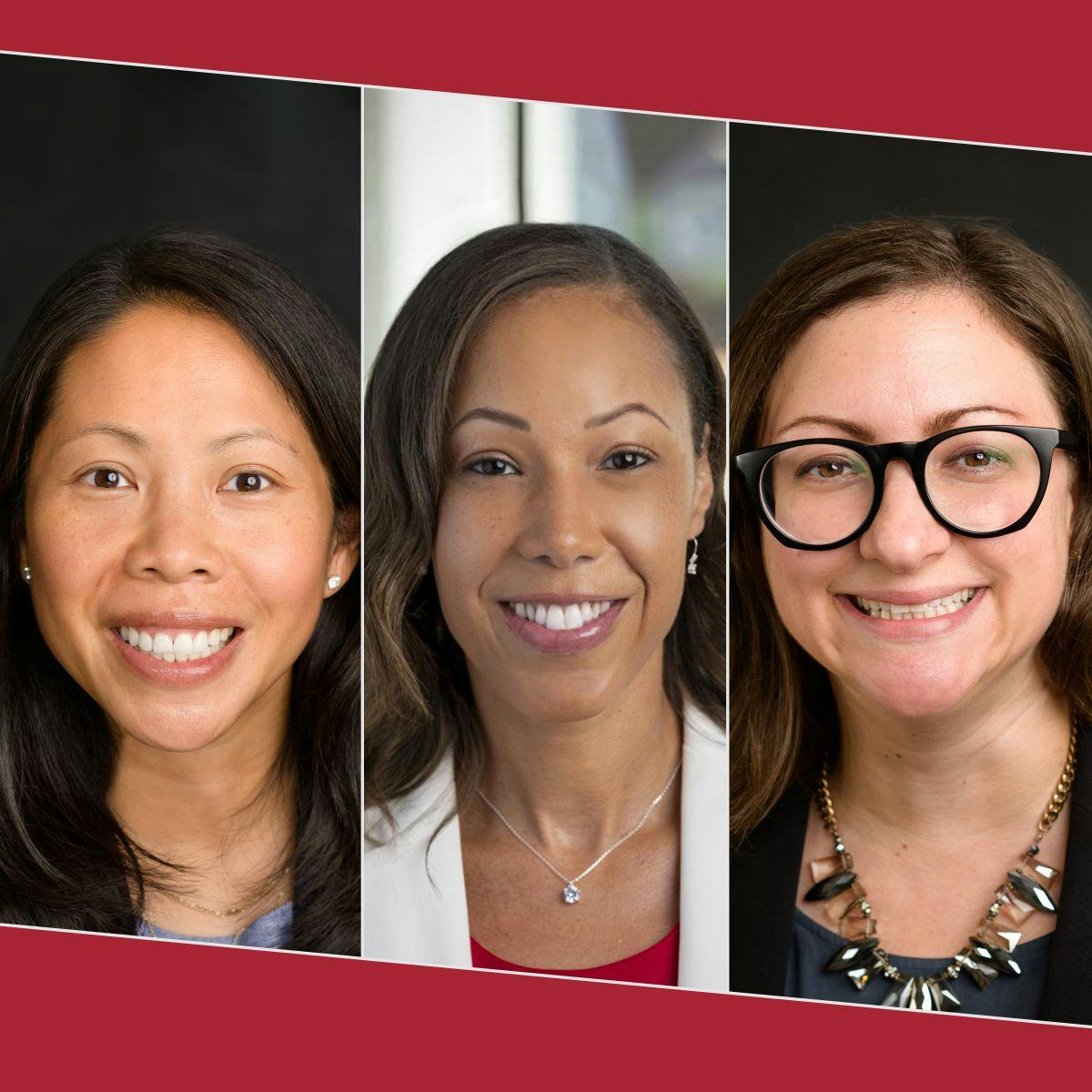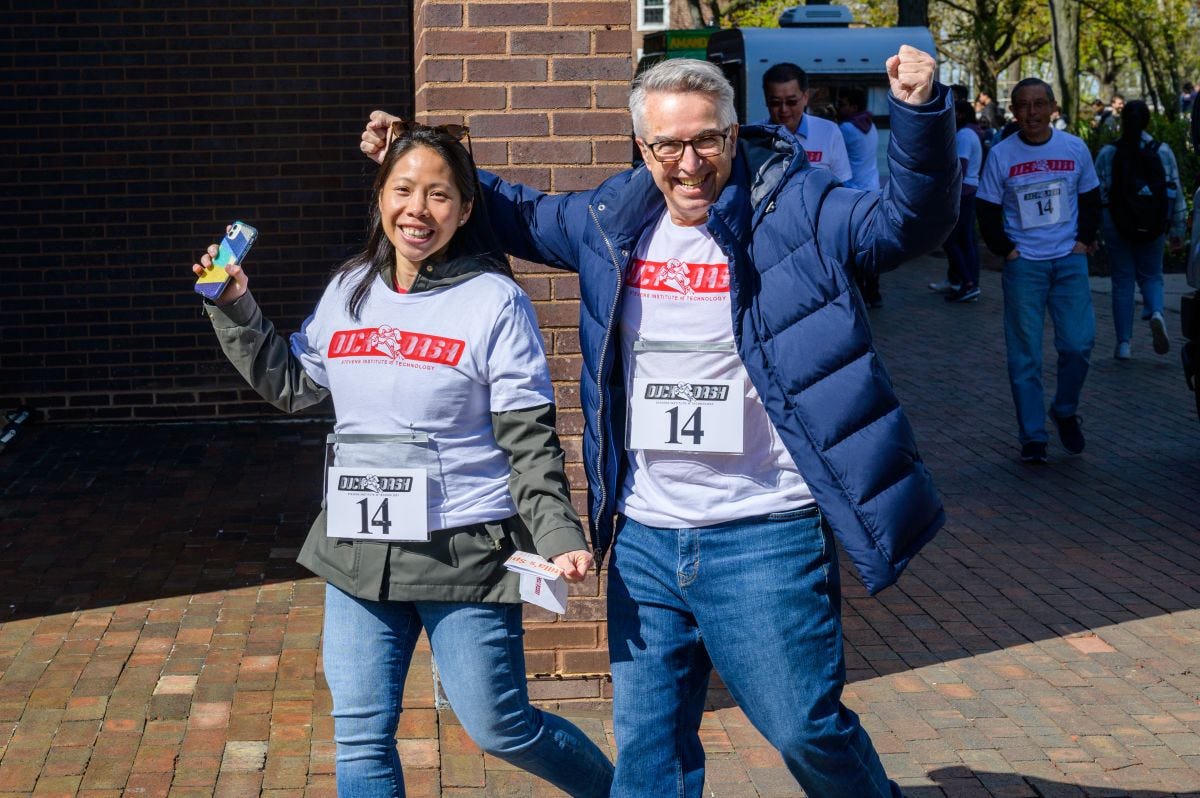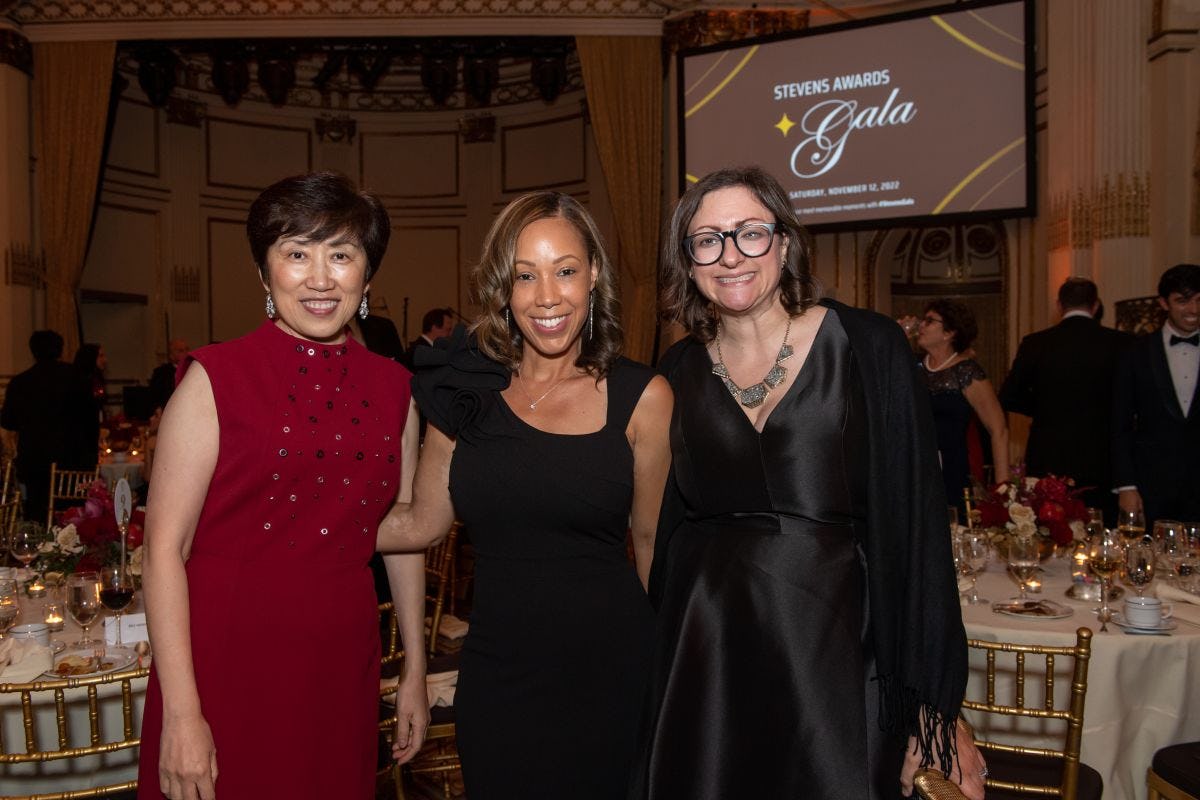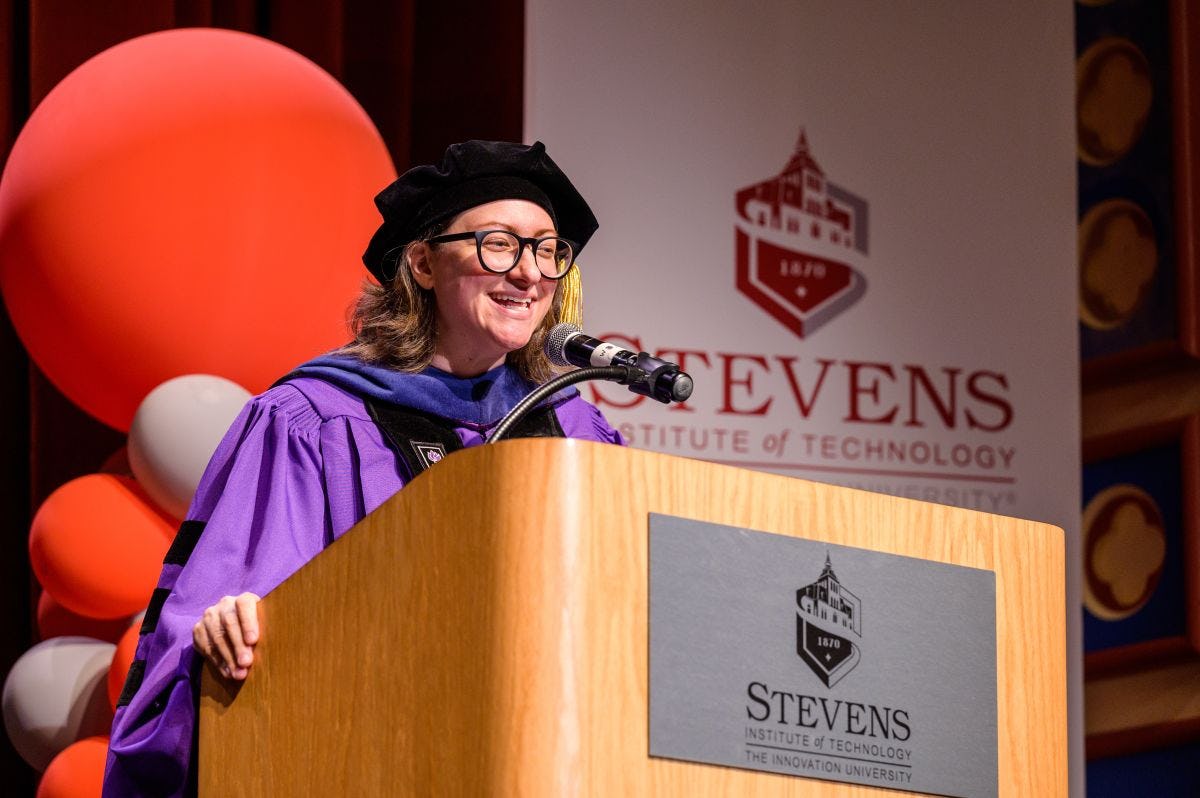
Following three national searches, new leaders in enrollment, human resources and student affairs joined Stevens’ presidential cabinet
As Stevens Institute of Technology rolled out a new Strategic Plan, Stevens 2032: Inspired by Humanity, Powered by Technology™, over the summer, the university’s presidential cabinet underwent its own strategic change. Following the departure of two longtime cabinet members, the creation of a new vice-presidential position and three national searches, new leaders took their seats at the table: Vice President for Enrollment Management Cindy Chin ’05 M.S. ’05, Vice President for Human Resources and Chief Human Resources Officer Sheraine Gilliam and Vice President for Student Affairs Sara Klein.
Chin, Gilliam and Klein — who took up their positions in August, September and July, respectively — bring with them fresh approaches to help Stevens accomplish the ambitious goals set forth in the Strategic Plan while capitalizing on the momentum built over the last decade. The three new vice presidents share some commonalities, but the tie that truly binds them is their trust in what Stevens is and their belief in what it can become.
The Homecoming Hero
Several years ago, having worked through a three-day Memorial Day weekend, Dr. Cindy Chin came to a realization: The hard work and long hours required by her position in the financial services industry didn’t bother her; the purpose of her efforts did.
“I never minded the work, but I wanted to see the impact,” she said. “I was looking for passion — something that would get me out of bed in the morning or prevent me from going to sleep at night. I wanted something that fulfilled me.”
After leaving financial services to work for a small nonprofit, Chin found herself continuing her “soul searching.” She would eventually return to Stevens in a professional capacity as an Admissions Counselor in 2012. Fast forward 10 years — through several progressively responsible roles at Stevens and experience at an educational technology company — and Chin, Vice President for Enrollment Management, is channeling her insider knowledge of Stevens with her well-honed expertise to achieve the University’s lofty goals.
“We should be a Top 50 school and I want us to be as great as we can be, so I won’t stop short of that.”
Chin’s aspirational approach keeps her focused on the task at hand, regardless of industry trends. As college enrollment continues to decline nationally, Stevens is experiencing growth in applications and enrollment. This past fall, the first-year cohort set new records for applications, percentage of women and academic distinction, all while significantly improving selectivity. The new Strategic Plan dictates that Stevens continue on this upward trend, while growing enrollment strategically.
“The growth in demand for a Stevens education is no coincidence, and it is directly related to to the stellar outcomes and the superior on-campus experience of our students. As Stevens becomes a more selective institution, the hardest part will be figuring out how to build our growing and increasingly talented community of incoming students,” she said.
Chin explained that building this community is, in large part, a process of meeting students and families where they are to help them decide if Stevens is the right school for them. Testing programs and the Stevens Pre-College Programs are great ways for high school students to get exposure to Stevens’ campus, as are tours — “led by students for an honest assessment”— interviews, visit days, counselor visits and college fairs.
It’s a challenge she looks forward to, professionally and personally.
“The sky is the limit for Stevens. As an alum, I see it, I feel it and I want to help us get there,” she said.
The Career Caretaker
Sheraine Gilliam is on a mission “to put the human back in human resources.”
“When I was researching Stevens and I saw the Strategic Plan tagline — Inspired by Humanity, Powered by Technology™ — I immediately texted it to my friend, and she replied, ‘If I had to describe you, those would be the words!’” she says. “I consider myself a ‘funky tech,’ which is someone who effectively integrates the functional and technological aspects of people operations to improve processes, the employee experience and workplace culture. I also lead with my heart, meet people where they are and take having someone’s career trajectory in my hands very seriously.”
For example, at a previous institution, Gilliam automated over 85% of HR processes and transactions by leveraging existing university technology, such as DocuSign, which reduced waste at the university by more than a thousand pounds in the first year alone. She also presented a national webinar for the College and University Professional Association for Human Resources on how HR professionals can gain credibility with IT partners and improve communication.
The connection to humanity and what it means for Gilliam’s role as Vice President for Human Resources and Chief Human Resources Officer is her main priority. With diversity, equity and inclusion and university culture the major areas of focus for HR over the next decade, treating Stevens faculty and staff as individuals is of the utmost importance.
“I want people to understand that DEI is more than just initiatives — it includes justice and belonging (DEIJB). To create an inclusive workplace, DEIJB must be embedded into our cultural DNA. It includes age, race, veteran status, individuals with disabilities, sexual orientation and so much more — it is simply a celebration of what makes us uniquely human,” she says.
As she continues to learn about Stevens’ history and culture, Gilliam's adjustment to her new professional home has been relatively seamless. Originally from Brooklyn, New York, she brings more than 20 years of experience in the field, including as Vice Chancellor and Chief Human Resources Officer for the University of North Texas System, where she oversaw human resources for more than 14,000 faculty and staff.
“I’m a young, Black woman, so I asked myself, ‘When I’m here at Stevens, do I feel like I belong? Can I find my place?’ And the answer was and is ‘Yes.’ Stevens creates a sense of belonging, a familial feeling. Is everything perfect? No, but what family is? We are lucky here at Stevens. We have a great leader in President Farvardin, a captivating story to tell and an amazing future ahead. I am excited and honored to be part of the Stevens family.”
The Campus Conduit
Dr. Sara Klein hit the ground running, developing a variety of projects and programs across campus with one common goal: a positively transformative experience for all Stevens students. It’s these students — undergraduate, graduate and online — that fuel her motivation.
“As a theater kid, I never thought I’d be at a STEM campus, but Stevens’ students are the No. 1 reason I do what I do,” she said. “They’re intriguing and brilliant, genuinely curious and they challenge me, but most important, they’re good people.”
Klein makes the claim based on her personal experience. Since joining Stevens in 2015 as the Assistant Vice President for Student Affairs, she has been hands-on with the student body, creating campus traditions, instilling a sense of pride and learning as much from them as she imparts to them. Her goal is for every student to feel connected to the larger Stevens community. She says this starts at the ground level, with her staff.
“Every student should be a part of our overlapping networks, through clubs, athletics and academics. We are working on a first-year experience course that will facilitate connections for new students with peers, administrators and faculty early on,” she says. Also in the works are living-learning communities for residential students developed around a variety of themes — women in STEM, for example — to connect students through identity and deepen the sense of community on campus, with guidance from a faculty fellow.
It's one in a slew of initiatives spearheaded by Klein, who relies on her foundational undergraduate experience at Washington University in St. Louis for inspiration. This manifested in a notable effort by Klein, her staff and the entire Stevens community to expand resources for and bring attention to the importance of mental health and wellness, which resulted in Stevens’ 2022 Active Minds Healthy Campus Award, recognizing Stevens as “one of the healthiest college campuses in the nation.” Mental health and wellness remain a campus priority.
Another priority? Ensuring that every student, regardless of background or circumstance, can learn and grow.
“One of the responsibilities of student affairs staff is to produce good citizens and good leaders, and you can’t be a creative, cutting-edge leader without the ability to connect with all different types of people, to understand the experience of others,” she says. “My goal is to be a leader, resource and advocate for all students so that Stevens is a place where everyone feels included, celebrated and that they belong.”
The Changing Face of Stevens Leadership
When selecting Chin, Klein and Gilliam for their respective roles, Stevens President Nariman Farvardin not only considered their fit for the job, but also their fit for the university and his cabinet.
“The three new voices in my cabinet bring not only fresh perspectives and insights, but also years of experience and a willingness to collaborate and challenge, teach and learn. They represent their divisions and this university with distinction. Stevens has already benefited from having them on the leadership team,” Farvardin says.
The gratitude goes both ways.
“President Farvardin thoughtfully created a high-caliber, rock star team, which has allowed for my colleagues to stretch me in ways I’ve never been stretched,” Gilliam says.
Klein agrees, noting her appreciation for the university’s continued resolve for excellence in all areas.
“There’s such a drive to be better and maintain a vision for what’s next and how much more we can do. I want to contribute to that,” she says.
Chin finds the cabinet’s diversity of thought as fundamental to the university reaching its goals.
“As a vice president and as an alum, I want Stevens to be stronger and even more successful,” she says. “That’s where all of our diverse perspectives can really have an impact.”





